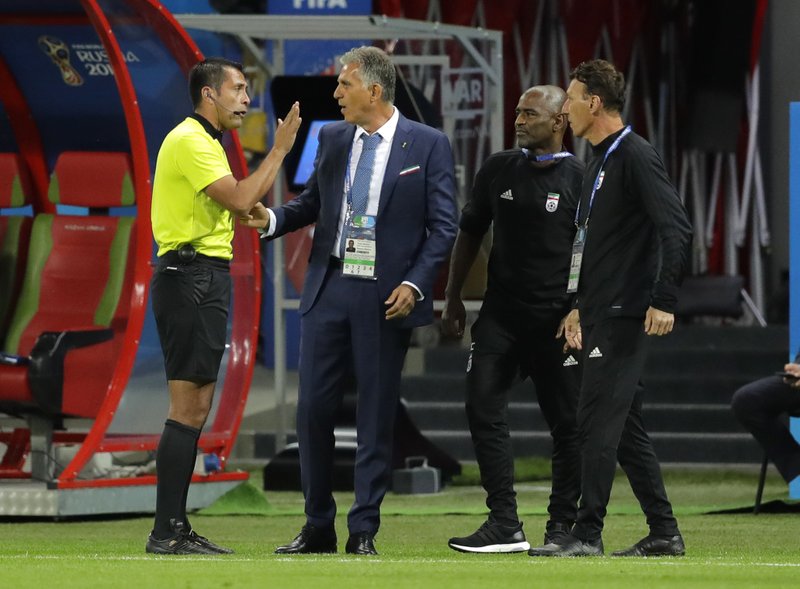
FILE – In this file photo from June 20, 2018, Iran head coach Carlos Queiroz, second left, talks to an assistant referee during the Group B match between Iran and Spain at the World Cup in Kazan, Russia, Spain won 1-0. (AP Photo/Sergei Grits, File)
SARANSK, Russia — Iran coach Carlos Queiroz lambasted what he said is the overuse of video review at the World Cup to overturn close and debatable calls instead of being limited to only correcting obvious mistakes.
In the past, the Portuguese was an outspoken proponent, but now he’s seeing problems with the implementation of the video assistant referee, or VAR, system.
“It’s a natural human thing when people make mistakes. VAR was not born to copy human mistakes. VAR was born to make it right,” said Queiroz, whose team had a goal overturned by video review in a 1-0 loss to Spain. “So, it’s not human to implement the system and come out with the same excuses that we had before. This is a question of principle.”
The system, he added Sunday evening, should only be used to change “clear and obvious mistakes.”
Saeid Ezatolahi’s goal against Spain on Wednesday was overturned after the video assistant referee for the game signaled that a player was offside. There was a long delay before the decision, which arguably cost Iran a crucial point in Group B play. Had Iran managed a draw with Spain, Iran would have been level with Portugal atop the group with four points and Spain would only have two points. Such a scenario would have considerably improved Iran’s chances of advancing out of group play for the first time in what is the nation’s fifth World Cup.
In the minds of Queiroz and his players — not to mention a member of Iran’s staff who was hospitalized after the goal was overturned — VAR effectively changed a debatable, judgment call, not an obvious mistake.
“It’s crucial and fundamental that a group of intellectual people are not intellectualizing the game behind the scenes (and) nobody knows what’s going on. This is not good for the future of the game,” Queiroz continued. “The game must be clear. Everything must be obvious.”
Queiroz said he was hesitant to criticize the system because when coaches complain about refereeing decisions, “it sounds like excuses,” and because such complaints tend to be met with punitive measures that he compared to famously huge waves crashing on beachgoers in Portugal.
But Queiroz added that in this case, he felt the urge to speak out because of the size of the World Cup’s audience.
“The people deserve to know what are the rules of the game because this is a game of the people,” Queiroz said, adding that if he is indeed punished for speaking out, “I’ll be here to try to swim and survive.”
The replay system also has been a talking point in Portugal’s matches, particularly after Spain’s Diego Costa appeared to push defender Pepe during the teams’ World Cup opener, which ended in a 3-3 draw.
The Portuguese asked for a review and were not given one, but Pepe didn’t seem all that bothered by it, even though he remains convinced he was pushed.
“I believe the (VAR) hasn’t really harmed Portugal or any sides that have played Portugal,” Pepe said.

